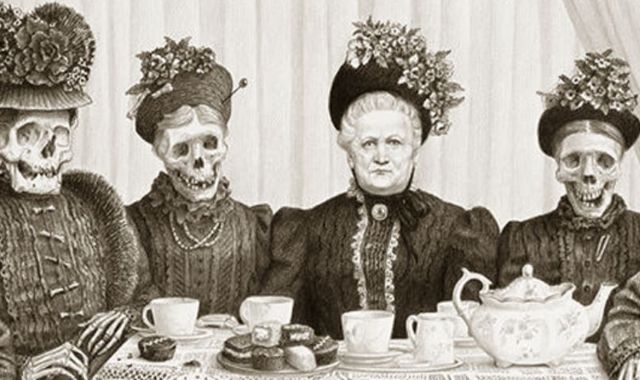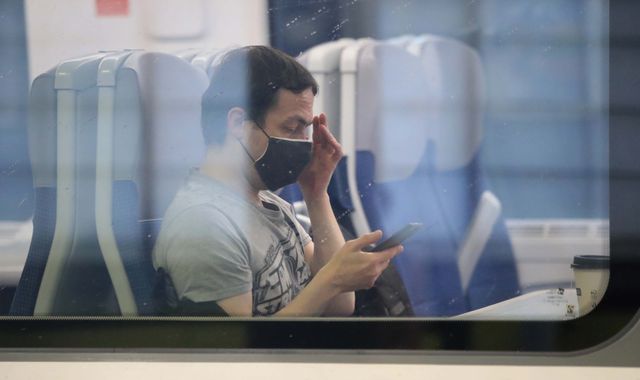Coronavirus: ‘Death cafes’ are opening on Zoom and Facebook. What are they and why are they ‘inundated’?
Written by News on 03/05/2020
Before lockdown, “death cafes” were a unique space offering complete strangers the opportunity to meet and speak openly about the often tricky topic of dying.


A subject many people find uncomfortable, these centres provide a warm and welcoming atmosphere for those who want to discuss death in a relaxed setting, usually over tea and cake.
With coronavirus spreading they were being inundated with more people than ever trying to come to terms with the thought of dying – but were having to turn people away due to lockdown.
So they have now moved online, offering their services virtually.
Nicole Stanfield, who runs the Taunton death cafe in Somerset, has been using Zoom and conducting Facebook lives to hold her meet-ups.
She says she has seen a huge increase in interest since the COVID-19 outbreak.
Participants want to talk about how the grieving process has changed and how to plan for end of life, she says.
“I feel like people have an increased sense of urgency now, and death seems less abstract when we hear about the number of dead every day in the news.
“People are realising that they should talk about and plan for death while it’s still possible.”
Caroline Dent, who runs the Finsbury Park death cafe in north London, says online meetings are gaining momentum.
“They are full and booked with a reservation list for each cafe,” she says.
Ms Dent says people want to discuss their worries about death itself and also about the business of dying.
“There is a lot of anxiety because death was ‘over there’ up until this pandemic. Now, it’s ‘here’ – it’s around all of us and it doesn’t discriminate.”
The rules around social distancing mean funerals have also changed significantly, with some also moving online.
Rabbi Miriam Berger, who lost her grandfather to coronavirus in March, officiated the funeral herself via Zoom, with family members dialling in from all over the world.
“By having all those faces on the screen, and by knowing we could see into each other’s eyes via those camera screens, actually created an intimacy you don’t think of within a virtual world, it created a real sense of togetherness,” she says.
“You could flick through the pages of screen after screen of family and friends who had joined us – we had over 200 people there with us – and actually that makes a difference, because we did feel supported and we did feel there were family and friends around us, we just weren’t physically at the cemetery together.”
Conducting the funeral via Zoom actually made it easier for her 96-year-old grandmother, she says, as she didn’t have to travel to the graveside but was still able to see many of her friends and family.
“Her words were, ‘I can really feel the love on this screen, I can really hear all of your love’ – and I think that was powerful for all of us, because it gave a sense of exactly what we needed her to feel in that moment.”
However, despite technology filling a void for now and the family finding some solace in the short-term, Rabbi Berger has concerns for the future.
“I think there’s going to be the sense that so many of us have been affected by this time, so many families will have had a bereavement within them and some will have had multiple bereavements,” she says.
“I think we will not totally understand what trauma society has been through perhaps for many years after we’ve gone out of lockdown.”
Mireille Hayden is an end of life doula, providing support and advice for families experiencing death and dying.
She also runs a death cafe, and hopes the pandemic will help change attitudes towards death.
“It is very difficult but we haven’t been facing it for centuries,” she says.
“Being faced with it on a daily basis is engaging people in the conversation and making people think, it could happen to me, whatever my age, so I need to have that conversation, put my plans in place; I need to make sure my close ones, loved ones and family are provided for and looked after.”
:: Listen to the Daily podcast on Apple Podcasts, Google Podcasts, Spotify, Spreaker
Her hope is this pandemic helps makes conversations about death easier.
“What we’re trying to do is help people put their plans in place and trying to deliver all the services that we were before lockdown, like death cafes and workshops – but virtually, so people can access that support and get all the help they need to put plans in place.”
(c) Sky News 2020: Coronavirus: ‘Death cafes’ are opening on Zoom and Facebook. What are they and why are they ‘inundated’?






